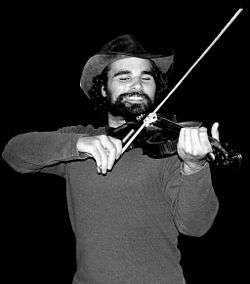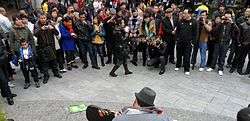Clint Miller (entertainer)
| Clint Miller | |
|---|---|
 Clint Miller live, 2013 | |
| Background information | |
| Birth name | Clinton Wray Miller |
| Born | August 11, 1984 |
| Origin | Abingdon, Virginia, United States |
| Genres | Blues, jazz, folk, rock, outlaw country, hip hop |
| Occupation(s) | Entertainer, producer, writer, researcher |
| Instruments | Vocals, guitar, piano, harmonica, violin, dobro, banjo, mandolin, cello, lap steel, ukulele, clarinet, sax |
| Years active | 1999–present |
| Labels | Clint Miller Music, Clint Miller Global |
| Associated acts | The Boys, The Red Envelopes |
| Website |
www |
Clint Miller (born August 11, 1984) is an American entertainer and writer.
Music

Miller dropped out of Yale College in 2004 to start work on a large concept album, Ballad of a Modern Day Cowboy: a Tragedy in Three Acts, which ultimately wove an hour-long story through twenty-one connected songs. Recording in a renovated stone castle in Knoxville, Tennessee, Miller performed upwards of fourteen instruments personally throughout the recording process.[1][2][3]

He released Ballad of a Modern Day Cowboy through his own independent label in 2006. In the United Kingdom, music critic Del Day noted, “There are few braver and indeed industrious records than this being released these days.”[4] American historian, reporter, and music critic Joe Tennis praised Miller’s vocal work, “a perfect vehicle for these 21 tales of woe on the road.” [5] In the Netherlands, music critic Wim Bolujt wrote, “Hoe origineel en goed gespeeld ook…” (“How original and well played too…”).[6] Appalachian music critic Mike Clark wrote, “He’s one heck of a musician as well, playing almost every instrument heard on Ballad of a Modern Day Cowboy… Miller is one of those once-in-a-lifetime writer/performers.” [7]

After releasing the album, Miller was accepted into Harvard College, and in 2009 he was honored with an Artist Development Fellowship awarded by the Office of the Arts.[8] With equipment he acquired through this Fellowship, Miller explored new avenues for music production and also began creating customized monaural and binaural beats (see neurological research).
Miller worked to popularize blues, ragtime, and bluegrass at Harvard, spreading awareness through festivals like Arts First[9] and Cultural Rhythms [10] while also being selected to speak and perform at the Harvard Bluegrass Symposium.[11][12] Scott Lozier, at the Harvard Arts Blog, wrote "I think they should start casting the Grammy statues for Clint. What a musician."[13]
Poetry and Philosophy
Miller’s first publication was a book of philosophy in verse, The Book of Change, which was released by Cambridge Scholars Publishing in the United Kingdom in 2007.[14]
Drama
Miller’s first play, Fate as It Relates to Cats and God, was staged at the famous Barter Theatre during the Young Playwrights Festival in 2002. Miller's next play, Our Diamond, went on to be performed all across America. It was published by Baker's Plays in 2009 and is now published by Samuel French. His most recent play, An Experiment, was staged at the Harvard Playwrights Festival in 2011. Miller's plays introduce new techniques for breaking the fourth wall to engage audiences unprecedented ways.[15][16][17][18]
Neurological Research
Miller was invited to Zhengzhou University in 2012 by Dr. Li Ying, and he began to design and conduct original experiments in the Psychology Department. He and his new team of post grad assistants became known as the Group Wisdom Research Team based on common themes of collective intelligence in Miller's experiments. A portion of the experiments used monaural and binaural beats to manipulate the perception of time for targeted groups of people, leading Miller to joke that he "invented time travel in China."[19]
Data from the experiments, which took place in 2012/2013, allowed Miller to develop new ideas on group wisdom and the perception of time and frequency. An article detailing a portion of this research, "Group Wisdom and Omnaural Perception: Discovering Frequency Differences by Averaging the Retrospective Time Estimates of Listeners," was peer reviewed and published by the International Journal of Bio-sicence and Bio-technology in 2014.[20]
References
- ↑ AmericanaUK, June, 2007, http://www.workingtitle.co/drafts/auk/modules.php?op=modload&name=Reviews&file=index&req=showcontent&id=2902
- ↑ The Warble, Issue 6, http://www.hcs.harvard.edu/thewarble/
- ↑ p. 35, The Loafer, 10-3-2006
- ↑ http://www.workingtitle.co/drafts/auk/modules.php?op=modload&name=Reviews&file=index&req=showcontent&id=2902
- ↑ http://www.swvatoday.com/archives/article_d91eb7af-288a-540b-933f-3dc2cff5f66e.html?mode=story
- ↑ Hanx (Netherlands), October, 2007
- ↑ p. 35, The Loafer, 10-3-2006
- ↑ http://news.harvard.edu/gazette/story/2009/03/ofa-ocs-name-2009-artist-development-fellowships/
- ↑ http://ofa.fas.harvard.edu/m/date.php?gdate=2011-04-30
- ↑ http://www.thecrimson.com/article/2009/2/27/diversity-remains-focus-of-cultural-rhythms/
- ↑ http://ofa.fas.harvard.edu/cal/details.php?ID=40851
- ↑ http://bluegrasstoday.com/bluegrass-at-harvard/
- ↑ http://ofa.fas.harvard.edu/wordpress/?p=2847
- ↑ http://www.cambridgescholars.com/the-book-of-change-13
- ↑ http://www.samuelfrench.com/p/7816/our-diamond
- ↑ http://ofa.fas.harvard.edu/cal/details.php?ID=42249
- ↑ http://www.vp-mi.com/entertainment/plains-drama-club-advances-to-nationals/article_4852b4d8-39fd-11e0-9fd7-001cc4c03286.html
- ↑ http://www.sentinelandenterprise.com/portal/mobile/ci_14285640?_loopback=1#ixzz34aGO6jxS
- ↑ http://www.theclintmiller.com/#!brain-experiments/c2re
- ↑ http://www.sersc.org/journals/IJBSBT/vol6_no1/16.pdf